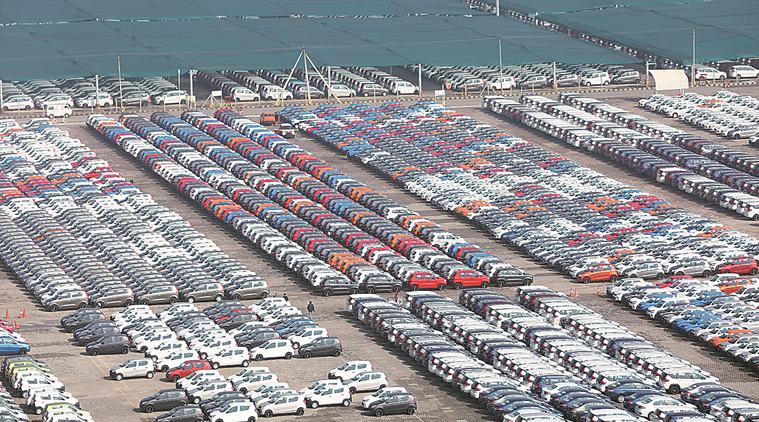 Maruti Suzuki India, the biggest manufacturer of passenger vehicles in the country, announced sales of 51,274 units in the domestic market in June 2020. Hyundai Motor India announced the sale of 21,320 units in June.
Maruti Suzuki India, the biggest manufacturer of passenger vehicles in the country, announced sales of 51,274 units in the domestic market in June 2020. Hyundai Motor India announced the sale of 21,320 units in June.
Maruti Suzuki India and Hyundai Motor India have reported a sharp rise in sales in June over the previous month — spikes driven by pent-up demand for cars, and a trend of first-time buyers choosing small and compact vehicles in order to avoid using public transport.
Both carmakers have experienced a faster recovery in sales in rural areas that are less impacted by the Covid-19 pandemic. There is also greater demand for CNG-run vehicles amid the continuous increase in the price of petrol over the past month.
Maruti Suzuki India, the biggest manufacturer of passenger vehicles in the country, announced sales of 51,274 units in the domestic market in June 2020. Hyundai Motor India announced the sale of 21,320 units in June.
MSIL and HMIL have close to 70 per cent share in the domestic market. In the small car segment, these two automakers have an even bigger share.
MSIL and HMIL also exported 4,289 and 5,700 units respectively in June 2020.
While retail sales for MSIL and Hyundai India are down by 53.8 per cent and 49 per cent respectively from the corresponding month last year, both companies have reported sharp increases in sales over May 2020.
While MSIL sold almost four times its May sales of 13,865 units in the domestic market, Hyundai Motors sold more than three times the May number of 6,883 units.
“Retail inquiries, bookings are back at 80-85 per cent of pre-Covid levels, Shashank Srivastava, ED, sales and marketing at MSIL, said. The reason, he said, was a “mix of several factors”.
“While there is some pent-up demand, a big part of this rise in demand is on account of people moving away from public transport and wanting to have their own vehicle. Besides, facilitation in terms of flexible financing schemes being offered in these times has also helped,” Srivastava said.
He added that while smaller cars are getting a lot of traction, “there is a clear trend of customers shifting towards CNG as petrol prices have shot up significantly over the last one-month. We have also seen faster recovery in rural markets less impacted by Covid-19.”
A Hyundai India official confirmed the trends of increased demand for smaller and compact vehicles from first-time buyers, and of the better recovery in rural markets.
While retail sales are rising and there is existing inventory in the market, there is lesser activity at the wholesale level, industry players said. “While our retail demand is back to 80-85 per cent of pre-Covid levels, the wholesale demand is back to only 50 per cent,” Srivastava said.
A Hyundai official said that the company had decided to keep its production level for FY’21 at 70 per cent of last year’s production.
Among other manufacturers, Toyota Kirloskar Motors announced more than double the sale numbers in June (3,866 units) over May (1,639 units). In June 2019, TKM sold 10,603 units.
Honda Cars India said it had despatched 1,398 units in the domestic market in June, as against 10,314 units in June 2019.
The trend of recovery is visible in the two-wheeler segment as well. Hero MotoCorp has said that it made wholesale deliveries of 4,50,744 units in June to dealerships, which was over four times the 1,12,682 units it despatched in May 2020.
“A major part of the market demand is emanating from the rural and semi-urban markets, which have been helped to a large extent by the various stimulus packages rolled out by the government. A combination of multiple factors, including the forecast of a normal monsoon, a bumper rabi crop and the upcoming festive season are expected to keep the momentum going over the next few months,” Pawan Munjal, chairman & CEO, Hero MotoCorp, said.
As the country went into lockdown and all production and sales froze, almost all passenger vehicle manufacturers registered zero sales in April. Some sales followed the government’s decision to relax restrictions in May. June has seen a much broader revival in retail activity.
Maruti sold 10,458 units in the mini segment (Alto & S-Presso) in June, down 44 per cent over the sales of June 2019. In the compact segment (WagonR, Swift, Celerio, Ignis, Baleno, and Dzire), it sold 26,696 units, down 57.6 per cent. In the utility vehicle segment, the company sold 9,764 units, down 45 per cent over the previous year.